All products featured are independently chosen by us. However, SoundGuys may receive a commission on orders placed through its retail links. See our ethics statement.
Bose QuietComfort Ultra Headphones vs Sony WH-1000XM5
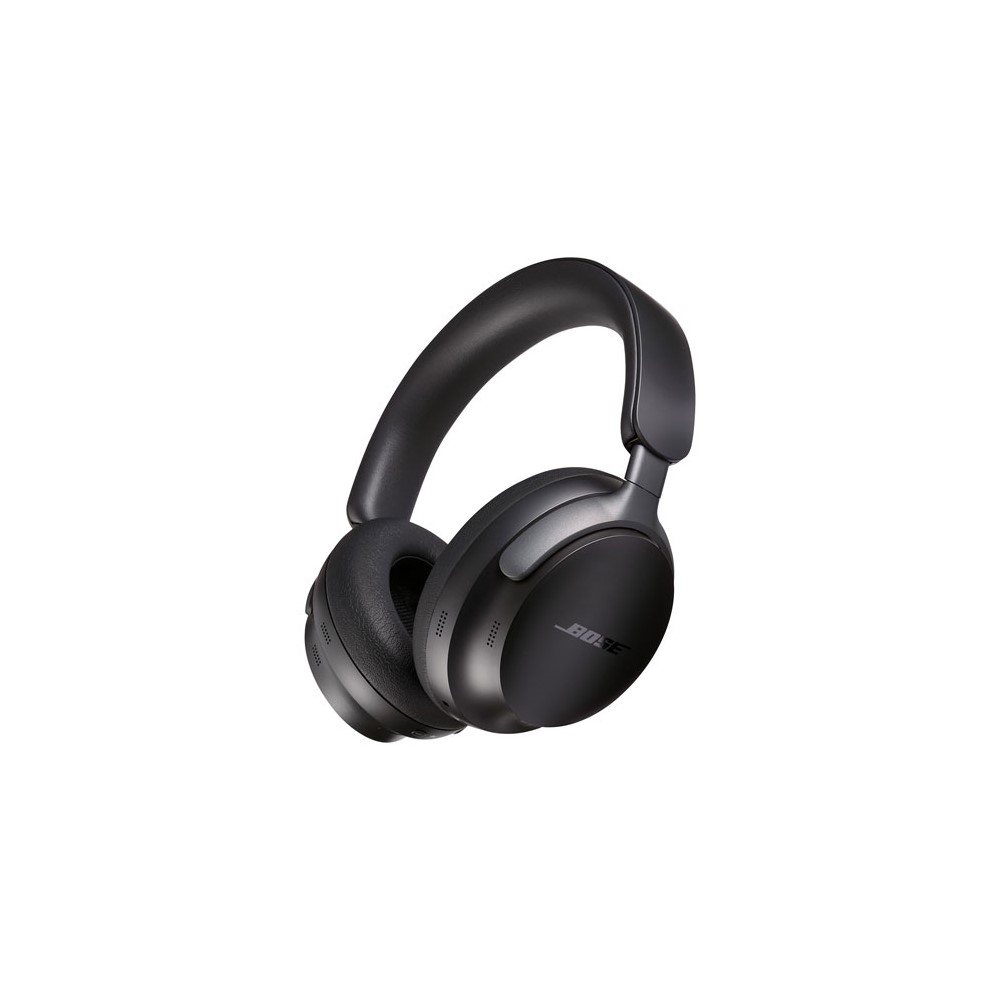
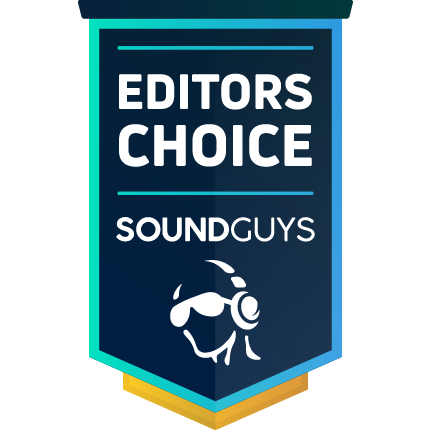


Now that Bose has re-entered the conversation for best active noise canceling (ANC) headphones on the market, how do they stack up against the previous top pick? Here, we compare the Bose QuietComfort Ultra Headphones vs Sony WH-1000XM5 to see which cans are worth your money.
Editor’s note: this article was updated on May 15, 2024, to add MDAQS results to the sound quality comparison section.
What’s it like to use the Bose QuietComfort Ultra Headphones compared to the Sony WH-1000XM5?
ANC headphones like the Bose QuietComfort Ultra Headphones and Sony WH-1000XM5 share a number of design elements, as what makes a good set of ANC headphones is in large part to each company’s efforts in the past. Bose and Sony both have done so much to shape what people expect that it would be notable if these headphones didn’t follow a very similar formula: both headphones offer top-of-the-line specs, soft leatherette padding, and deep ear cups designed to isolate very well.
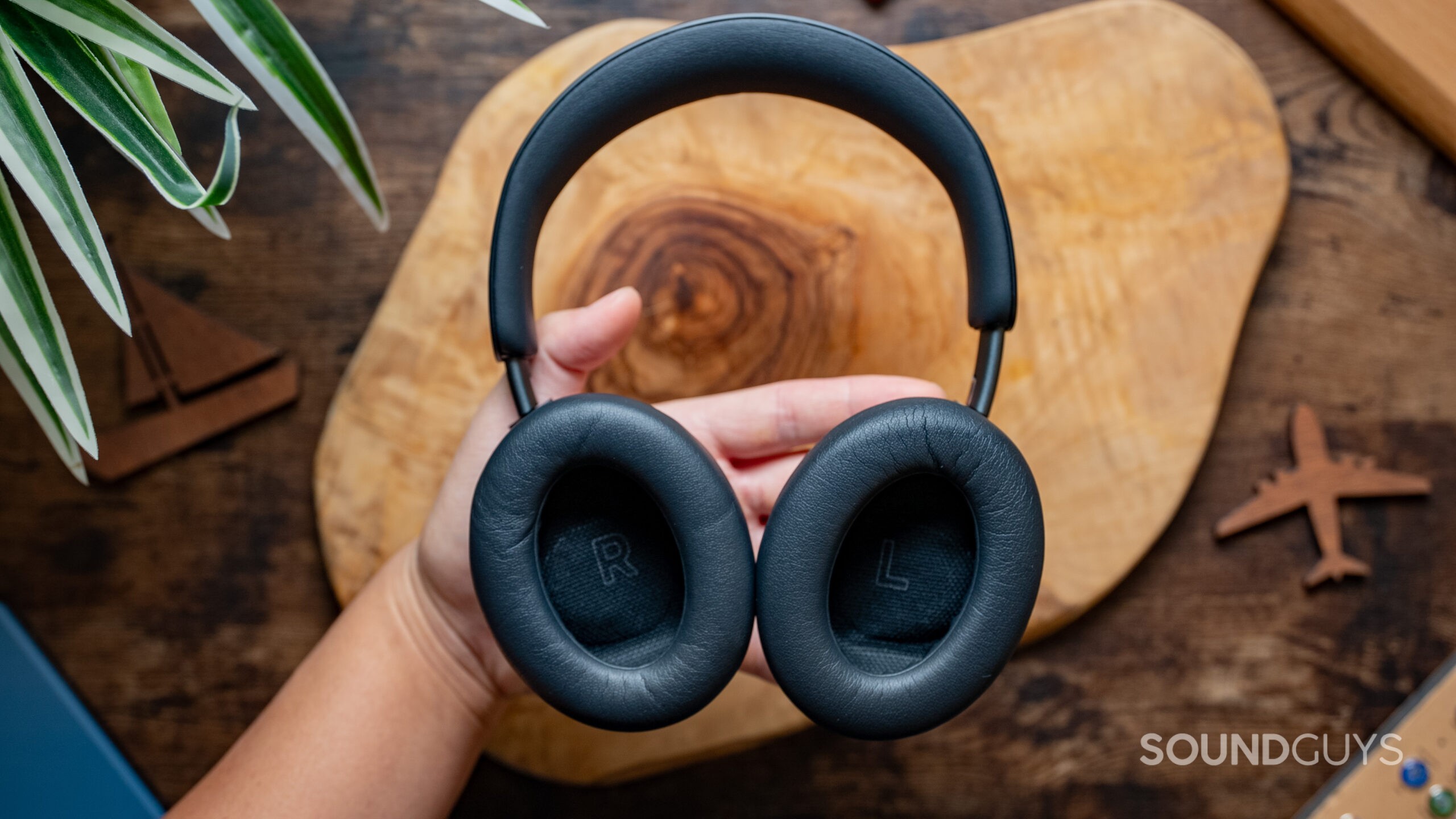
Both headphones are comfortable enough to be worn for hours on long flights. Both headphones are similarly light, but the Bose QuietComfort Ultra Headphones are more portable, owing to their carrying case and ability to fold down to fit inside. The Sony WH-1000XM5, on the other hand, can only fold flat.
Though neither set of headphones have any sort of ingress protection rating, minor rain or sweat won’t negatively affect them. However be careful: just because we didn’t run into water issues doesn’t mean you won’t.
How do you control the Bose QuietComfort Ultra Headphones and Sony WH-1000XM5?
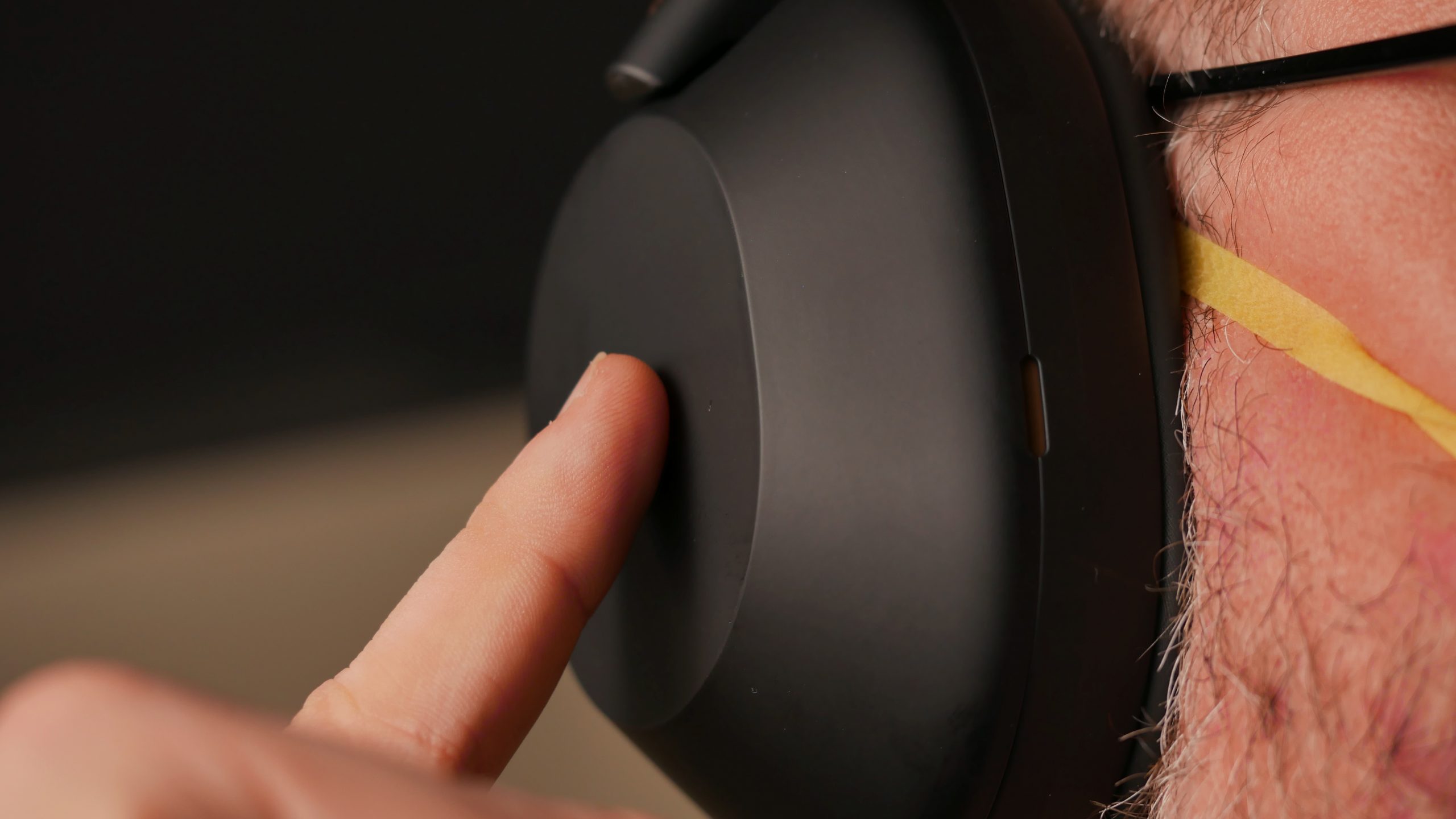
Controls for both headphones are about as different as you can get, as the Bose QuietComfort Ultra Headphones primarily use physical buttons for playback and call control, whereas the Sony WH-1000XM5 use a collection of touch gestures. Though there’s no right or wrong way to make controls for headphones, we tend to recommend cans that use the touch gestures because they run less of a risk of compromising the seal that they make with your head.
Bose QuietComfort Ultra Headphones controls:
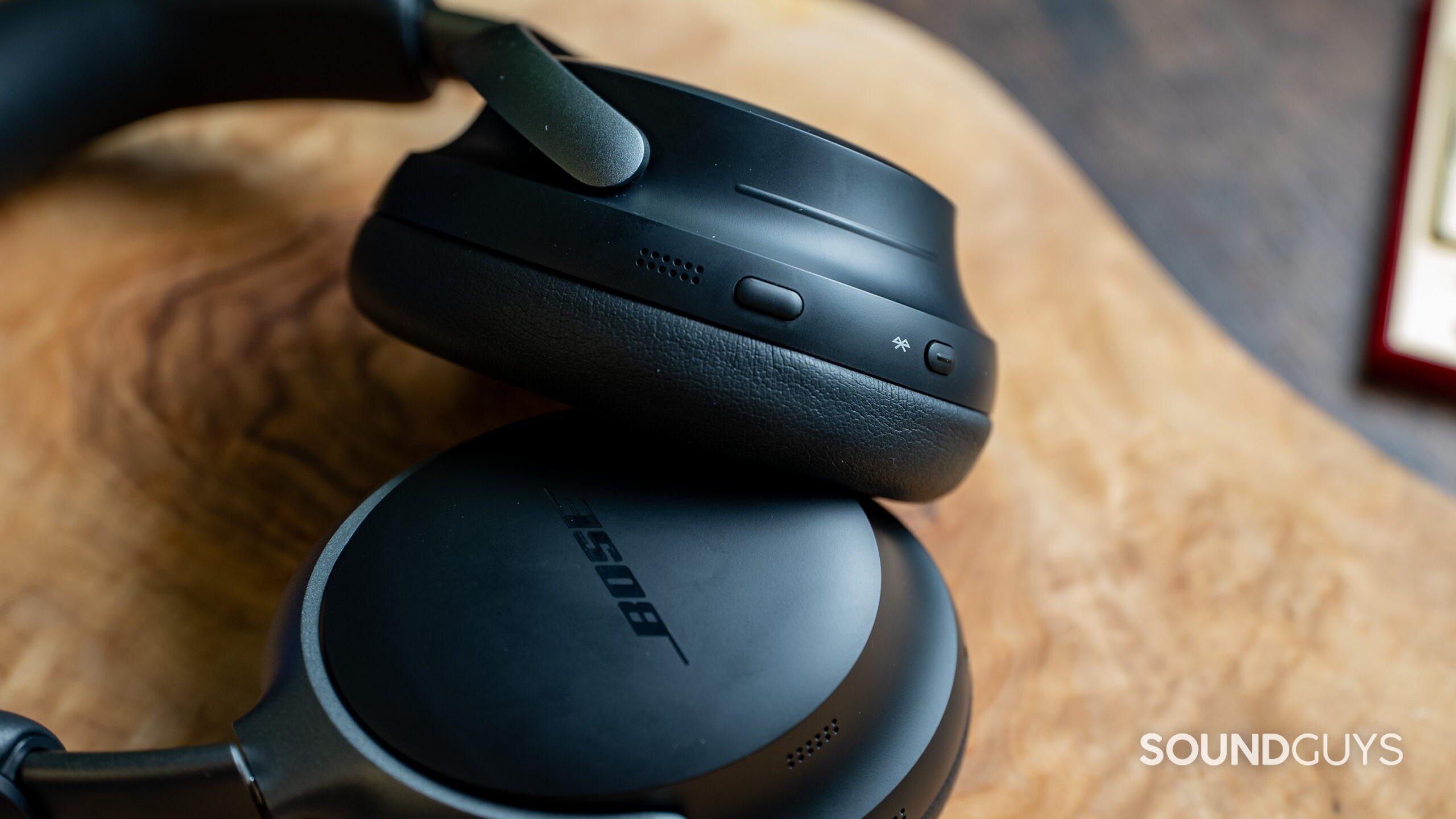
| Action | Multi-function button | Bluetooth / Power button | Volume strip |
|---|---|---|---|
| Action Single tap | Multi-function button Play / pause | Bluetooth / Power button Battery level check | Volume strip N/A |
| Action Double tap | Multi-function button Track forward | Bluetooth / Power button N/A | Volume strip N/A |
| Action Triple tap | Multi-function button Track backward | Bluetooth / Power button N/A | Volume strip N/A |
| Action Long press | Multi-function button ANC mode change | Bluetooth / Power button On / off | Volume strip Shortcut (define in app) |
| Action Swipe | Multi-function button N/A | Bluetooth / Power button N/A | Volume strip Volume up / down |
There’s limited ability to customize controls, for example you can use the Bose Music app to change the function of the shortcut. However, there’s really not a whole lot you can change about either headphone in terms of control customization — you’ll need to use your phone for the advanced stuff.
Sony WH-1000XM5 controls:
| INPUT (touchpad) | ACTION |
|---|---|
Swipe up | Volume up |
Swipe down | Volume down |
Swipe forward | Track forward |
Swipe back | Track back |
Hold (center) | Voice assistant |
Double tap center | Pause / resume |
Cup hand | Ambient sound passthrough |
Should you use the apps of either Bose QuietComfort Ultra Headphones or Sony WH-1000XM5?
If you’d like to equalize your headphones, enable either spatial audio features, or get OTA firmware updates, you’ll need to install the Bose Music app or the Sony Headphones Connect app. That said, it’s not required for either headphones — so if you’re a privacy-conscious individual you may elect to forgo these apps.
Bose has a web-based updater tool if you connect the Bose QuietComfort Ultra Headphones to your computer over USB-C, but Sony does not. If you want to perform firmware updates with the headphones, you’ll need to install the app.
How do the Bose QuietComfort Ultra Headphones and Sony WH-1000XM5 connect?
Though both headphones are primarily intended to connect via Bluetooth, either can be used with a wired source. The Bose QuietComfort Ultra Headphones have a 2.5mm to 3.5mm TRS cable included in the packaging, and the Sony WH-1000XM5 uses a simple 3.5mm TRS cable. Easy peasy.
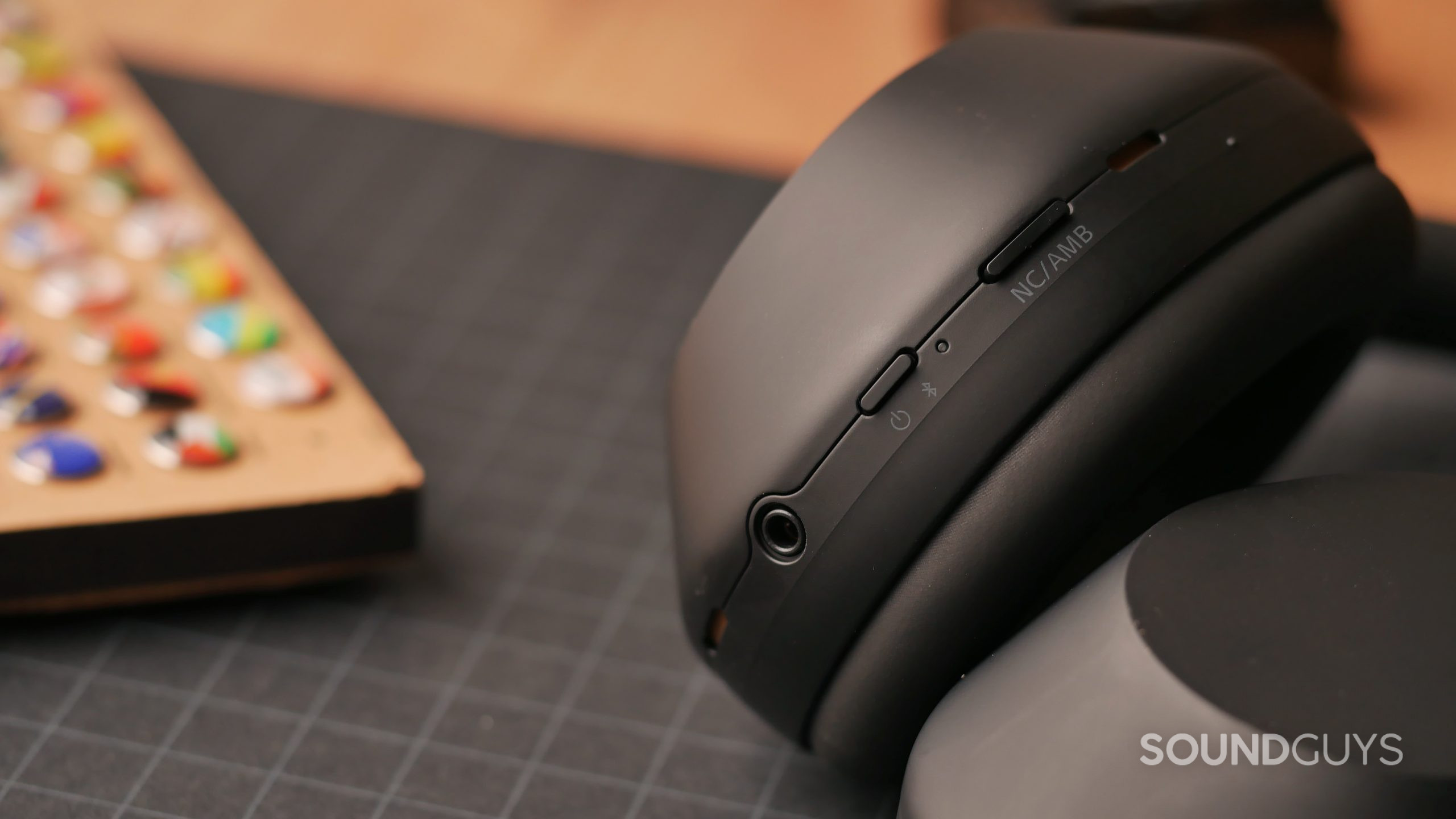
However, each headset takes a different approach to offering high-bitrate listening over Bluetooth. The Sony WH-1000XM5 uses Sony’s proprietary codec LDAC — previously the best on the market — to get higher-quality tunes to your ears. Because of its age, LDAC is supported by most Android phones, though iPhone users will be out of luck. The Bose QuietComfort Ultra Headphones, on the other hand, uses a newer platform exclusive to Android smartphones that use a Qualcomm Snapdragon 888 or newer processor: Snapdragon Sound. You don’t really need to worry about the specifics here; just know that if you have a phone with these specs, the Bose QuietComfort Ultra Headphones will use a high-bitrate codec called aptX Lossless that boasts better latency and data transfer rates than LDAC. We should point out, however, that the improvement is not a huge one, just slightly better.
Is battery life better on the Bose QuietComfort Ultra Headphones or Sony WH-1000XM5?
We test every set of headphones, earbuds, and gaming headsets with the same battery life test in our labs, making our results comparable from product to product. In a clear win for the Sony WH-1000XM5, lasting 31 hours and 53 minutes with ANC on, while the Bose QuietComfort Ultra Headphones can only last 27 hours and 37 minutes under the same conditions. Though 4 hours and change isn’t a huge difference proportionally, that’s an extra day of commuting or a half of a work day. That’s a difference you’ll notice.
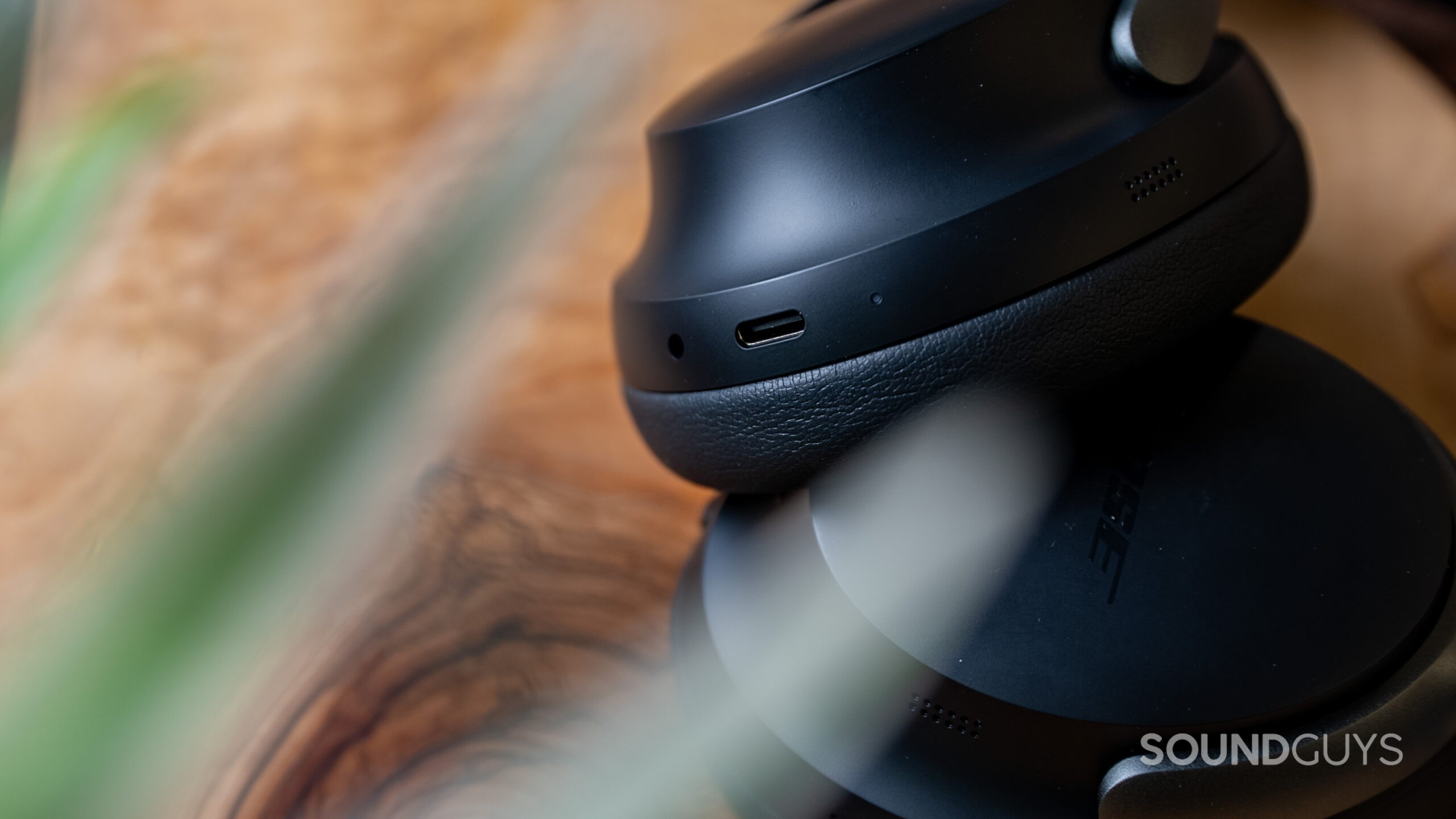
To compound this one, over time the reduced need to charge will mean that over the course of a year or two, you’ll have put less strain on the Sony WH-1000XM5’s USB-C port and battery by having significantly fewer charge cycles. This helps keep your headphones in good working order, hopefully avoiding the landfill. Side note: always recycle your headphones, don’t throw them away.
Do the Bose QuietComfort Ultra Headphones or Sony WH-1000XM5 cancel noise better?
Both the Bose QuietComfort Ultra Headphones and Sony WH-1000XM5 represent the top end of the market when it comes to ANC headphones, so we’re not comfortable saying that either model will be obviously better than the other. However, by our measurements, the Bose QuietComfort Ultra Headphones ekes out a win here.
Loading chart ...
Because both headphones isolate ears so well, you’ll notice that they will block out a lot of outside noise even when you’re in a fairly loud environment. Just remember that ANC headphones are not a substitute for hearing protection, and the main reason they are beneficial is that they allow you to listen to your music at a much quieter volume.
Loading chart ...
Both of these headphones are stellar noise cancellers.
Do the Bose QuietComfort Ultra Headphones sound better than the Sony WH-1000XM5?
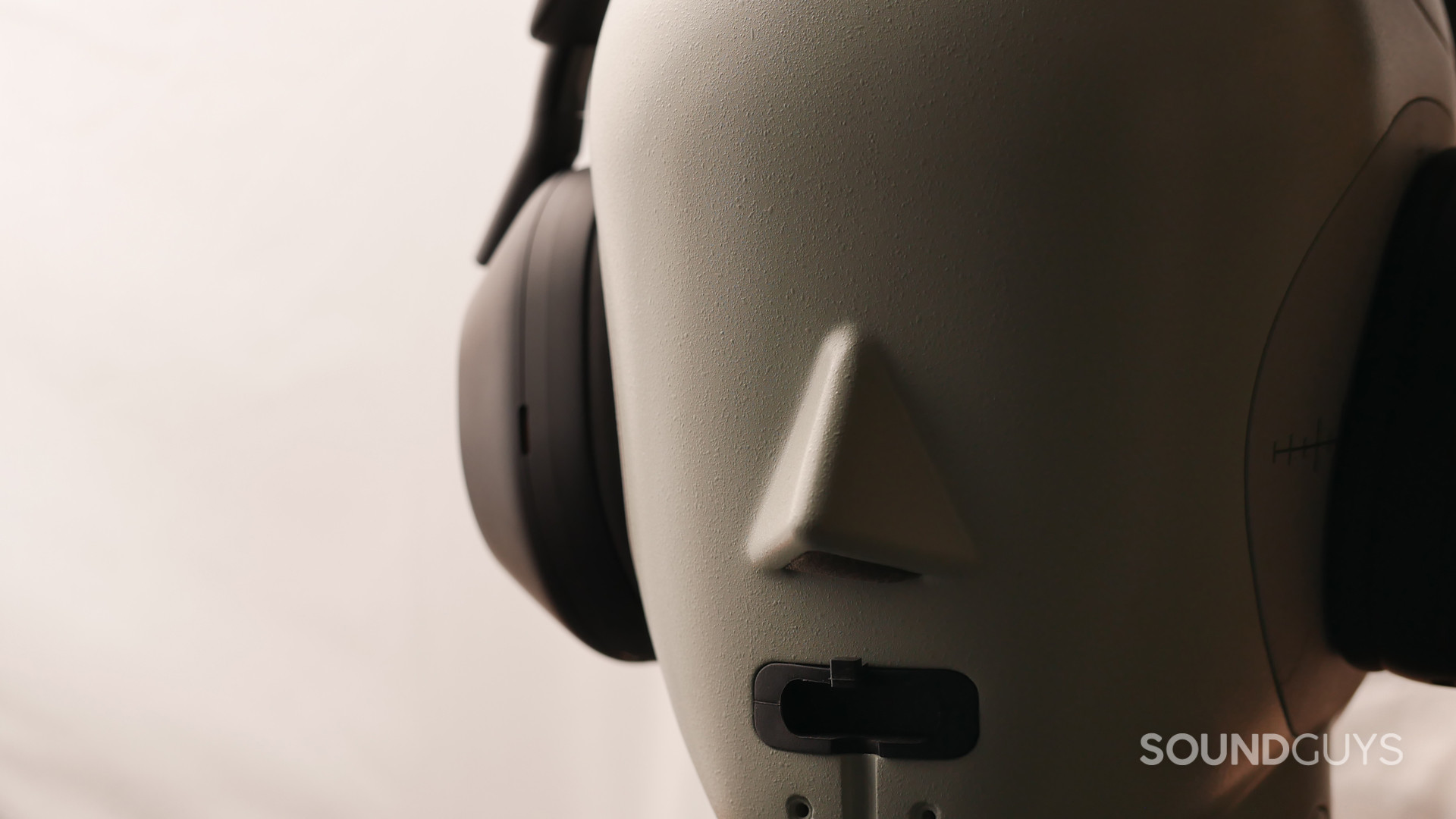
Which headphones sound better will come down to personal preference and your willingness to tinker to get your cans to sound the way you want them. Both the Bose QuietComfort Ultra Headphones and Sony WH-1000XM5 sound pretty good to most people, but they have their quirks. Neither headphone meets our headphone preference curve perfectly, but that’s not necessarily a bad thing for you.
Loading chart ...
Though both headphones are bassy, the Sony WH-1000XM5 has a more pronounced “bass shelf” that can make some vocals and instruments a bit tough to hear. We suggest using the app to tick the “clear bass” option down two notches to keep this in check. Similarly, you might want to use the “Bass Reducer EQ” preset with the Bose QuietComfort Ultra Headphones to make sure that overemphasis on the lows isn’t too extreme for you.
Because both headphones use high transfer-rate Bluetooth codecs, you’re unlikely to notice any issues with fidelity. However, neither is truly lossless, but that’s one of the reasons we still have wired connections. Still, these two headphones are some of the most popular ANC headphone models for a reason, and a big part of it is the sound quality. Only the Focal Bathys and Apple AirPods Max noticeably surpass these headphones for audio quality.
Multi-Dimensional Audio Quality Scores (MDAQS)
The chart below shows how the sound of the Bose QuietComfort Ultra Headphones and the Sony WH-1000XM5 was assessed by the Multi-Dimensional Audio Quality Score (MDAQS) algorithm from HEAD acoustics.
Both headphones perform decently in perceptual assessment. Tuning and immersiveness are the headphones’ strong points, though the Bose are slightly more consumer-friendly if MDAQS is to be believed.
- Timbre (MOS-T) represents how faithfully the earbuds reproduce the frequency spectrum and temporal resolution (timing information).
- Distortion (MOS-D) represents non-linearities and added noise: higher scores mean cleaner reproduction.
- Immersiveness (MOS-I) represents perceived source width and positioning: how well virtual sound sources are defined in three-dimensional space.
See here for an explanation of MDAQS, how it works, and how it was developed.
Do the Bose QuietComfort Ultra Headphones or Sony WH-1000XM5 have a better microphone?
The microphones of both the Bose QuietComfort Ultra Headphones and Sony WH-1000XM5 are excellent, though they have minor differences. This is not one of those things that should make or break your buying decision simply because they perform so similarly. You may notice that the Sony WH-1000XM5 fares slightly better in windy conditions, but that’s about it. If you would like to hear for yourself — and see how others prefer the mic quality of each set of headphones — then listen using the widgets below.
Bose QuietComfort Ultra Headphones microphone demo (Ideal conditions):
Sony WH-1000XM5 microphone demo (Ideal conditions):
Bose QuietComfort Ultra Headphones microphone demo (Windy conditions):
Sony WH-1000XM5 microphone demo (Windy conditions):
Which microphone sounds best to you?
Bose QuietComfort Ultra Headphones vs Sony WH-1000XM5: Price and availability
Because both Bose and Sony are two of the biggest headphone brands out there, you should not have any trouble finding either the Bose QuietComfort Ultra Headphones or Sony WH-1000XM5 anywhere online or in big box stores. Since the Sony cans have been out for over a year, you should be able to find them on sale more readily than Bose’s offering. The Sony WH-1000XM5 started $30 cheaper than the Bose QuietComfort Ultra Headphones, and on sale, that gap should widen considerably.
Should you get the Bose QuietComfort Ultra Headphones or Sony WH-1000XM5?
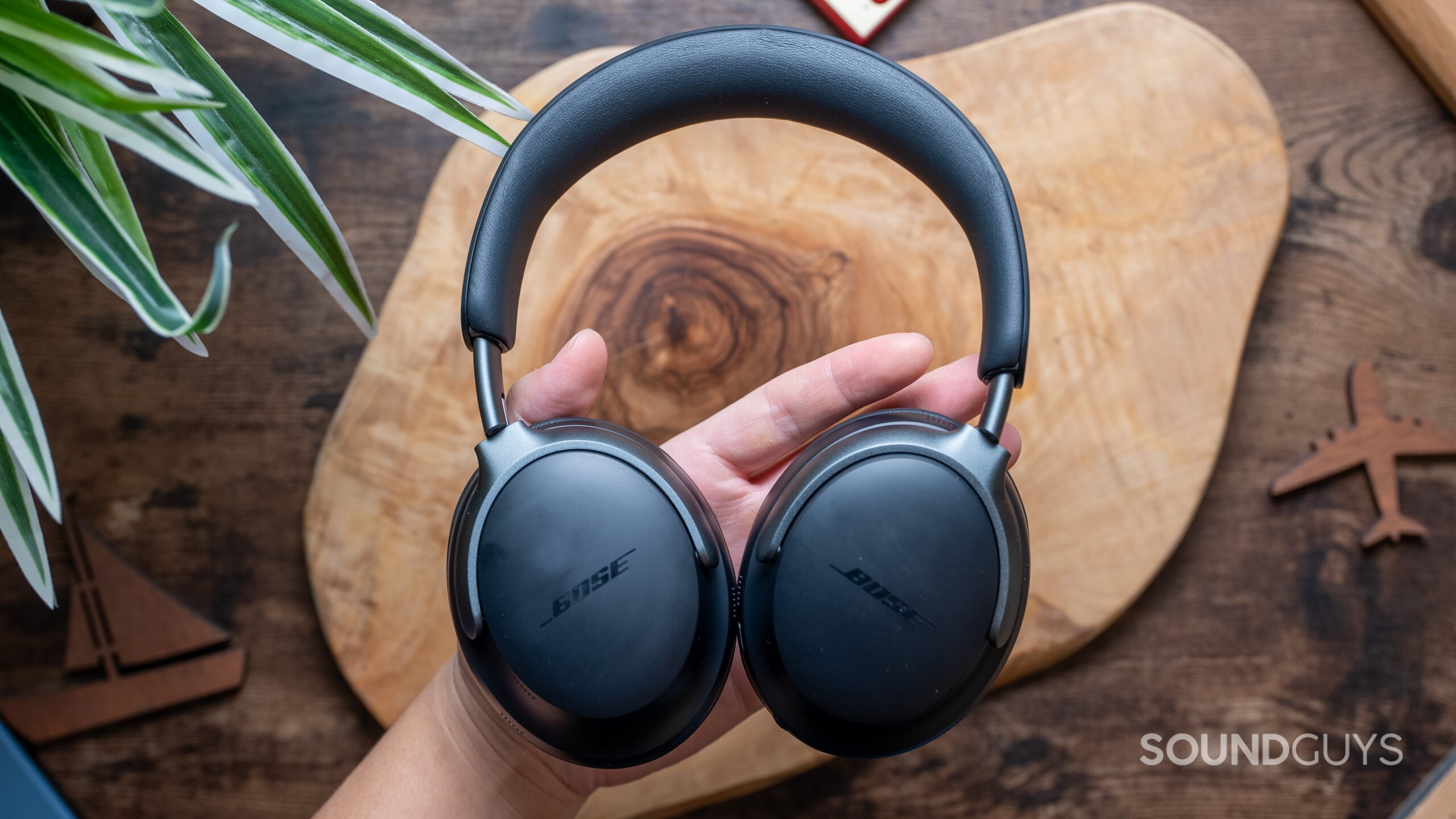
Neither of these headphones will leave you wanting more, but the Bose QuietComfort Ultra Headphones will set you up well into the future for a longer period of time. Though LDAC had its heyday and was, for a long time, the best Bluetooth had to offer, Snapdragon Sound seems to be ready to supplant it in the market, and the Bose QuietComfort Ultra Headphones will stay relevant for longer because of it.

Outstanding microphone
Useful app features
That’s not to say you won’t be happy with the Sony WH-1000XM5 if you can get it at a discount; on the contrary. They offer some of the best ANC out there, they are easily equalized to your preferences, and they support Sony’s 360 Reality Audio. Some people may be willing to put up with the slight step down for the superior controls as well: the differences are not as big as they may seem. But it really just comes down to how much you want to spend on headphones and if you absolutely must have the latest and greatest instead of something that’s merely excellent.
Frequently asked questions
No.
Both headphones can be used for gaming, but both headphones will not perform better than a headset designed for that purpose. Bluetooth adds latency to your audio, so you may want to use something else.
Neither headphones boast any ingress protection that would qualify as “good for workouts,” so we advise getting some headphones that are more suited to the task.
Yes, you can compare samples of each above.
Yes, they are among the best on the market currently.